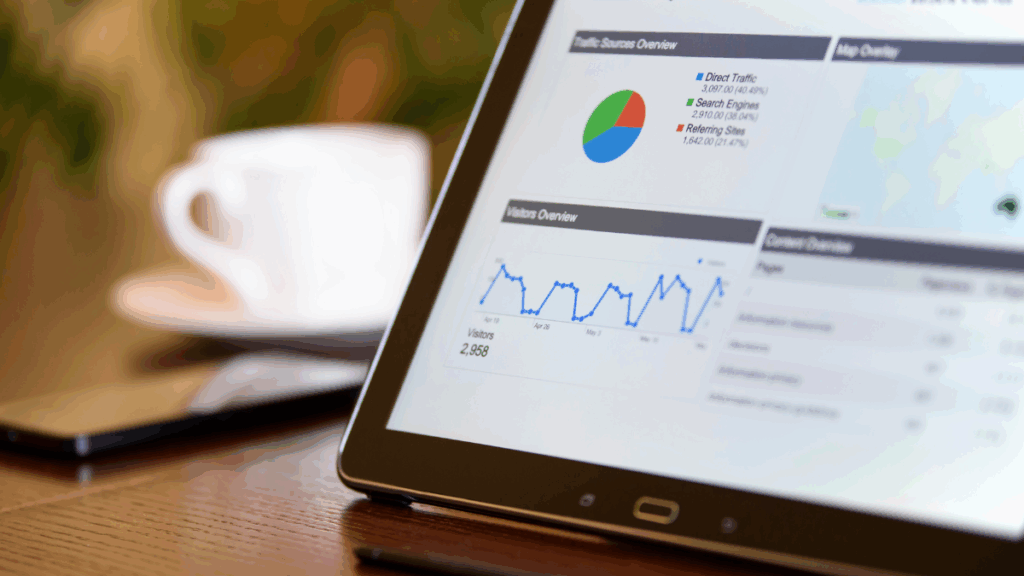
Read The Ultimate Guide to Mobile Analytics
Mobile App Analytics: What it is, how it can contribute to App Success?
If app development is one part of the app success, app analytics contribute to another side of it. App analytics is an integral part of app marketing. Let’s see what app analytics is and how it contributes to app success.
What is app analytics?
App analytics is a method of analysing user behaviour within the app. In this method, data is collected to study user behaviour to decide the best strategy for user retention, engagement as well as conversion.The main objective of app analytics is to increase app usage, repeated usage, and in-app purchases.This method is used by all sorts of mobile app development companies today to get deep insights of the user behaviour and app performance. It helps them in increasing app’s lifetime value, usage rate and retention.
When we say mobile analytics, what we actually mean is analysing the data collected by a mobile app. Hence it has to do with watching your app’s performance and understanding the user experience. Monitoring of user sessions, app events, gestures, and anything else that might provide insight into improvement opportunities can be considered mobile analytics.

Examples of mobile analytics
Mobile analytics involves any data that the app gathers about either a mobile user’s performance or the mobile user’s interaction with it. Examples commonly include:
- Web analytics
- Funnel analysis
- Heatmaps
- App performance and usage
- Click-through rates
- Mobile conversion rates
- Retention rates
- Demographics of signed-up users
- Traffic sources (for mobile websites)
The different types of mobile analytics to consider:
Mobile app analytical platforms offer an almost limitless ability to drill down into data. A business might want to emphasis one of the major types depending on its model and objectives:
- Mobile advertising analytics: In-app advertising can generate big bucks for your business. Mobile advertising analytics tell you how well your ads perform and who interacts with them, so you can look for opportunities to increase your income.
- App Monetization analytics: Even free apps can be monetized via in-app purchase on mobile, subscriptions or maybe affiliate marketing; Monetization analytics show you how well these methods are doing and their contribution to your income.
- In-app engagement analytics: In-app engagement analytics give you quantitative data on how people audience segments use your app on average. Key metrics could include:
- How often do users open your app on their mobile devices
- How long have they used it for
- Which featuresdo they use most
- App store analytics: Your performance in the app store will affect how many people find and download your app. App store analytics help you track key metrics like:
- Rank in app listings
- Downloads
- Device type
- Reviews
10 common mobile app analytics mistakes to be wary of
Analytics for mobile app and product…is an art. Avoiding these will give you more insight into your data while also squashing the time it takes to climb the learning curve.
- Starting with no optimization goals and objectives
- Concentrating on a single success metric considerably
- Trying to track everything
- Not digging deeply into the data
- Doing just like everybody else is
- Ignoring behavioral data
- Relying purely on mobile analytics
- Makes it difficult to have a meaningful DAU (daily active user) definition
- Using meaningless names in your event parameters
- Ignoring the needs of other teams
Benefits of app analytics
Mobile landscape is becoming a juggernaut day by day. There is an overwhelming competition between app-driven companies that are trying to establish their venture. App analytics help businesses understand user behaviour and we can also call it as actions, with respect to app features and functionalities. This lets app marketers analyse how often users visit the app and which section is getting the most visits and how much time users spend there. It will help in building an efficient mobile marketing strategy and ultimately it will result in increased ROI.
App analytics will bring the following set of benefits:
- It will help you emphasise on only right users and features
- It will help you update your marketing and branding strategy

Where Mobile Analytics Help Your App:
-
Customer retention
With the efficient mobile app analytics strategy, you can engage the targeted users & retain them as well.You’ll also be able to check when they used the app, how much time they spent, and how they navigated from page to page.
-
In-app referrals tracking
In-app referrals is important for any app to increase downloads. App analytics helps in tracking the referral codes of the app each user receives.
-
App performance monitoring
App analytics help developers monitor app performance issues like slow load times, layout glitches, and abrupt crashes.
-
Targeted customers analysis
You can use app analytics to check your users are from which geography, what age or what gender. So you can sharpen your marketing strategy to yield better outputs.
Top Mobile App Analytics Tools
Platforms: ios, Android
Features
- Easy to understand
- Integration with Google Play for conversion tracking
- Comprehensive report of acquisitions, users, engagement, and outcomes

Platforms: iOS, Android, Java ME, Windows Phone, Blackberry
Features
- Detailed report
- Create up to 10 custom dashboards
- User paths and funnels
Platforms: iOS, Android
Features
- Analytics across multiple apps
- Real time tracking
- Segment users based on events, funnels, cohorts
Platforms: iOS, Android, Windows Phone, Blackberry
Features
- Open source
- Track events and user segmentation
- Track sets of events

In today’s digital ecosystem, the smartphone is the primary interface for billions of users. For any business, mastering the mobile experience is non-negotiable, and the key to mastery lies in mobile marketing analytics. This guide provides a deep dive into what is mobile analytics, its diverse types of mobile analytics, its crucial role in big data, and the immense benefits of mobile analytics for achieving business goals.
What is App Analytics?
Mobile app analytics (or app analytics meaning) specifically refers to the metrics and tracking performed within a native application (iOS or Android). This includes monitoring features that are unique to apps, such as push notifications, in-app purchases, and device-specific interactions.
📊 The Five Goals of Mobile Analytics
Effective mobile analytics serves critical strategic goals for any digital business:
- Optimize User Acquisition: Identifying which channels (ads, organic search, social media) drive the most valuable users.
- Maximize User Engagement: Understanding what features users love and what causes them to abandon the app, leading to better feature prioritization.
- Boost Retention and Loyalty: Pinpointing the moments or user segments most likely to churn and deploying targeted interventions (e.g., specific push notifications).
- Increase Conversions and Revenue: Tracking user paths that lead to in-app purchases, subscriptions, or key business outcomes.
- Improve App Performance: Monitoring technical issues like crashes, load times, and API errors to ensure a seamless user experience.
📈 Types of Mobile Analytics Explained
When discussing types of mobile analytics, it’s helpful to categorize them based on the insights they provide:
1. Behavioral Analytics (The “What” and “How”)
- Focus: Understanding user actions within the app.
- Key Metrics: Downloads, Daily Active Users (DAU), Monthly Active Users (MAU), session length, feature usage, and user flows (the path a user takes through the app).
- Example: Tracking the percentage of users who add an item to their cart but don’t complete the purchase.
2. Marketing and Attribution Analytics (The “Where”)
- Focus: Attributing user acquisition to specific campaigns or sources, crucial for mobile marketing analytics.
- Key Metrics: Cost Per Install (CPI), Lifetime Value (LTV) by source, Return on Ad Spend (ROAS).
- Example: Determining whether an ad campaign on Facebook or Google yielded higher-value users. This is the heart of mobile marketing analytics in digital marketing.
3. Performance/Technical Analytics (The “Why Not”)
- Focus: Monitoring the technical health and stability of the app.
- Key Metrics: Crash rates, API latency, load times, device types, and operating system versions.
- Example: Identifying that users on older Android devices experience a higher crash rate on a specific screen.
4. Qualitative Analytics (The “Why”)
- Focus: Gathering direct and indirect feedback to understand why users behave the way they do.
- Key Metrics: In-app surveys, heatmaps, session recordings (replay of user screen taps), and customer support tickets.
- Example: Using session recordings to see users repeatedly tapping a non-interactive element, indicating a poor UI design.
🌐 Mobile Analytics in Big Data and the Cloud
The volume, velocity, and variety of data generated by mobile users place mobile analytics in big data territory. Every tap, swipe, and login generates a data point.
- Mobile Data Analytics requires powerful platforms to process millions of events per hour. Modern systems use cloud-based, scalable architectures to handle this load.
- Types of mobile analytics in big data often involve predictive analytics, where machine learning models are trained on historical mobile data to forecast churn or recommend personalized content.
- The Power of the Cloud: The term Social Mobile Analytics Cloud (SMAC), though a bit dated, highlighted the convergence of these four technologies: Social, Mobile, Analytics, and Cloud, which remain the foundational pillars of modern digital strategy. The cloud infrastructure enables rapid, real-time data processing essential for instant decision-making in mobile marketing.
✅ Five Importance (Benefits) of Mobile Analytics
The benefits of mobile analytics translate directly into business success:
- High-Precision Personalization: It allows marketers to segment users based on actual behavior, enabling personalized communication (e.g., targeted push notifications) that significantly boosts engagement.
- Optimized User Experience (UX): Analytics identifies friction points and bugs, leading to faster, more stable, and easier-to-use apps, which directly impacts retention.
- Data-Driven Feature Development: By observing feature usage, product teams can retire unused features and prioritize building what users demonstrably want, maximizing development ROI.
- Accurate Budget Allocation: Mobile marketing analytics precisely attributes revenue back to the original marketing source, ensuring that marketing budgets are spent on channels that deliver the highest LTV users.
- Competitive Advantage: Continuous data monitoring allows businesses to react quickly to market changes or new user behaviors, keeping them ahead of competitors.
🛠️ Mobile Analytics Tutorial & Guide
For a business looking to leverage analytics for mobile apps, here is a brief app analytics guide:
- Define Your KPIs: Before installing any tool, clearly define your key performance indicators (KPIs). For an e-commerce app, this might be Conversion Rate and Average Order Value. For a content app, it might be Retention Rate and Session Length.
- Choose a Platform: Select a dedicated mobile app analytics platform (e.g., Firebase, Mixpanel, Amplitude, or adjust). Your choice should align with your scale and specific needs (e.g., strong attribution vs. deep behavioral tracking).
- Implement SDKs Correctly: The platform’s Software Development Kit (SDK) must be integrated into your app’s code. Crucially, event tracking must be standardized across all platforms (iOS and Android) to avoid data silos.
- Track Key Events: Implement custom event tracking for every critical user action: “Product Viewed,” “Subscription Started,” “Tutorial Skipped,” etc.
- Create Cohorts: Group users by their acquisition date or a specific action (a “cohort”). Analyzing cohorts is the best way to track the true long-term impact of product changes on retention.
Mobile Analytics Examples
- E-commerce App: An app tracks that users who interact with the “Wishlist” feature have $30\%$ higher LTV than those who don’t. Action: Promote the Wishlist feature more aggressively.
- Gaming App: The analytics tool shows that $60\%$ of users drop off at Level 3. Action: Test making Level 3 easier or introduce a clearer tutorial/reward system before the level.
- SaaS App: Push notification analytics shows that a message sent at 8 AM has a $15\%$ open rate, while one sent at 6 PM has a $40\%$ open rate. Action: Shift the primary push notification time to 6 PM.
Conclusion
Mobile Analytics has been essential nowadays, as there is a juggernaut competition between app marketers. Most of the app analytics tools work like Google Analytics, so if you’ve prior experience in using Google Analytics, it is easier to understand and use the app analytics tool. The landscape of mobile analytics in digital marketing is the single most important tool for growth in the app economy. By diligently collecting and acting upon mobile data analytics, companies can move beyond guesswork, optimize every facet of the user journey, and ultimately, guarantee their place in the competitive mobile sphere. The future of marketing is personal, performant, and, above all, mobile-driven.







